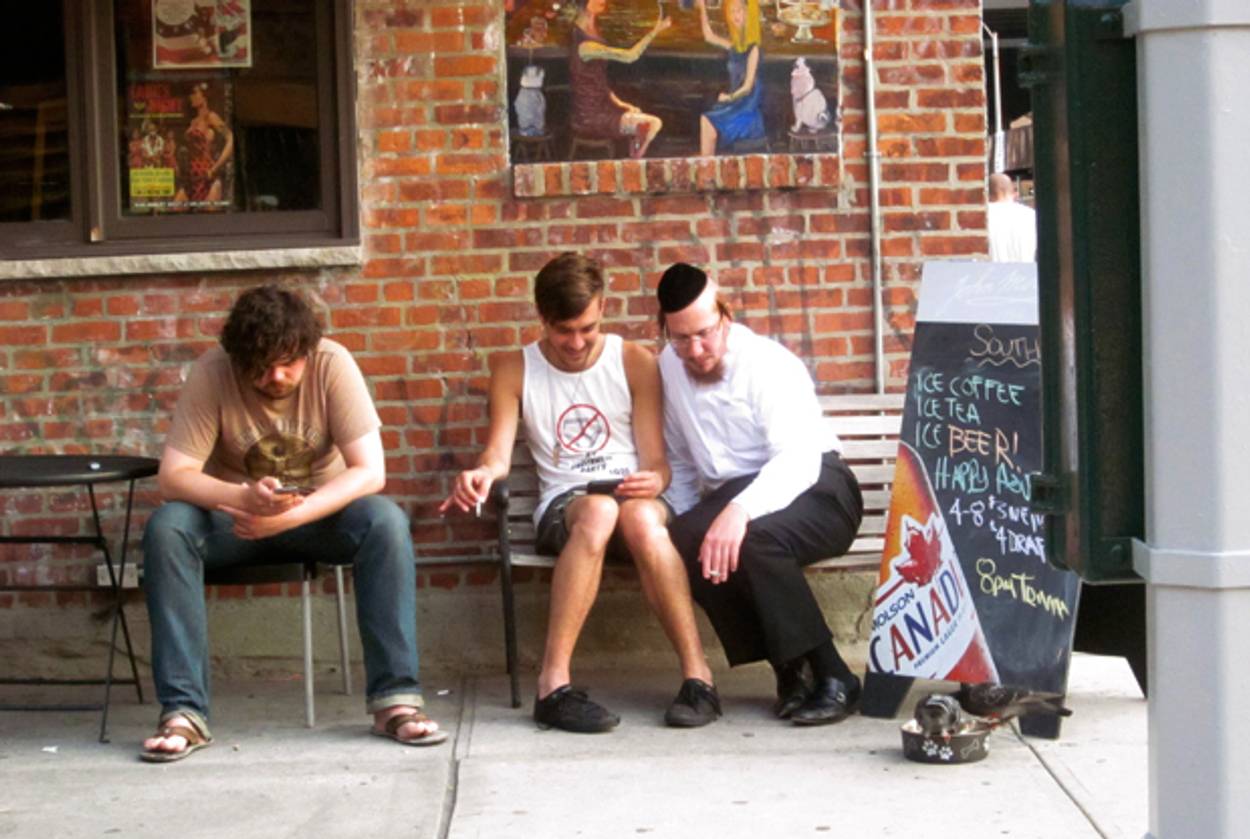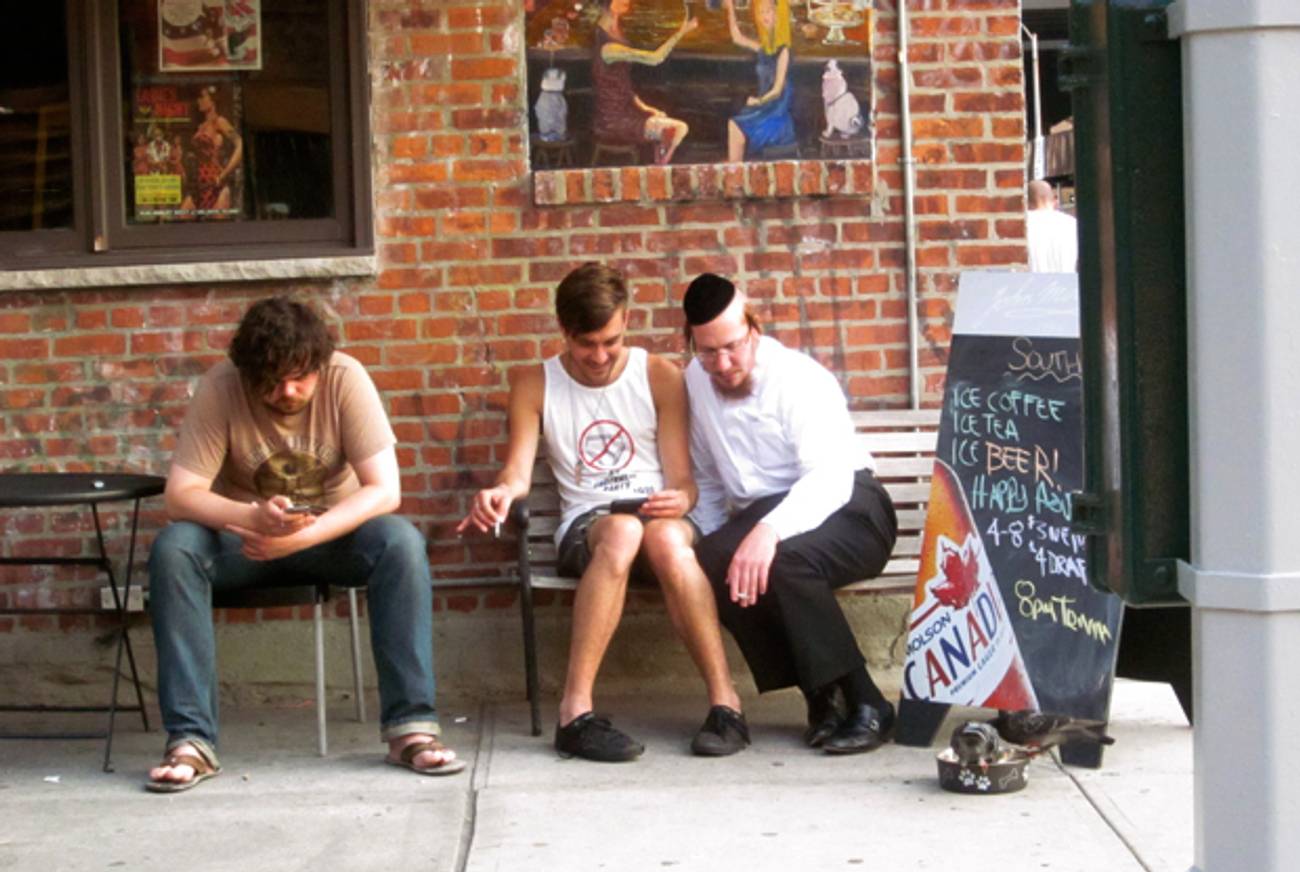New Republic
I grew up in a world of observance, separate from secular America, but soon realized that the borders are more porous than they seem




Although my father is a citizen of the United States, he lives in his own republic: the republic of the Talmud.
To be sure, every man lives in his own republic. In one republic, love is the currency; in another, lust; still another, and it is industry. But my father lives in the republic of the Talmud—along with several other relatives—where discourse is valued above all else.
They are decidedly not steeped in Scripture. On the contrary, the noise in my father’s mind is informed by the parliamentary debates of the Talmud—the sing-song back and forth about an egg that was laid on a holiday. I could always rely on him for logical, Talmudic takes on the universe, whether the subject was the maximum permissible height for a sukkah, or something as secular as the moon landing.
Needless to say, my father has always dressed the part. Once when I was young, after months of pleading, my father took me to my first baseball game, a double-header at Yankee Stadium. My father wore his white shirt, tie, jacket, and hat. When I pointed out that he was dressed differently than most Americans, the idea seemed utterly surprising to him. I persisted: “Do you see anyone else here, among 50,000 people, wearing a hat, a white shirt, or a tie?” I asked him. It was only when I asked him to compare himself to the throngs, person by person, that he finally conceded that he was living in his own republic. Ultimately, in a somewhat desultory nod to this grand American, secular cathedral, he ordered a beer and kosher peanuts.
Growing up, I myself was a citizen of that very same austere republic, albeit a restless one. I went to a black-hat yeshiva where the entire emphasis was on the Talmud. I tried to pay attention, but I couldn’t. Having nowhere near the talent for Talmud of my father, brother, or cousins, I was much more distractable. I was taken with an American way of life: movies, muscle cars, and the promise of reckless abandon and bounty.
So, did I root for an ordered, impregnable universe of laws, or for the delicious mayhem of modern mischief? I was conflicted, but one thing I was sure of: In a world where I can rely on almost everyone, I desperately needed, to quote Brecht, someone upon whom I could not rely. And when the world yielded such surprises and surprising figures, it was sweet beyond nectar.
Another close relative of mine, my cousin, a great Talmudist, would often paraphrase the Mishna, saying that a man is a man by virtue of his self control, not by the conquests of cities. It was this very same man, closeted in his study with people-sized volumes of Talmud and commentary strewn about, who lived in a world without women—and happily so, it would seem.
Except for one curious thing: Whenever we were together and a woman passed by, he would daringly and hilariously (and harmlessly) flirt with her. I remember once my sister and I were visiting him. My sister had along with her a devastatingly attractive redheaded friend. Her friend’s hair was parted down the middle with rabbinic exactitude, revealing a sliver of milky-white scalp framed by red hair that hung down like sheets of expensive glass. “Pardon me,” my cousin said, “but you have the most glistening scalp!”
How I loved it, this breach of the sacred walls, by one of its own sentries, no less. From the outside, it may have seemed that these worlds were hermetically sealed off from one another, but there were cracks all over the place. I would lie in wait in great hunger for real life—persistent, gentle, rich, and un-bowed—to poke through and challenge the Talmudic Republic. Love, lust, temptation, ambition, and even the latest of the late 20th-century scourges, the sovereign self, would, like an urban tree root, eventually crack the cement sidewalk. Or at least try.
***
A year ago, I was on a plane returning from Florida and was seated next to an exceedingly good-looking couple. They were among the last to board the plane, full of life-gladness and what seemed to be young lust. They carried each a small pizza and immediately and enthusiastically purchased several small bottles of hard liquor from the flight attendant. In a flash, they set about doing what you might expect young people blessed with heaping amounts of hormones to do.
They did not disturb me in the slightest, though it was hard not to notice. I sat in the aisle seat, unperturbed, memorizing a page of Talmud from a volume with such small print I was using a magnifying glass. I thought to myself: Here is pure lust matched against the icon of restraint–the sacred Talmud—a titanic battle. Which would dominate?
To my great surprise, the young man to my left kept interrupting his bliss with this beautiful young woman to ask me questions about the Talmud. “I am Jewish,” he said. “I have learned Hebrew, but I have never studied the Talmud.”
I answered his questions briefly at intervals, and then we each went about our business. But he kept coming back to make various statements and ask questions. I kept suppressing the following Talmudic question that was rising inside me: If you have a beautiful woman next to you and you are in the throes of carnal pleasure, why is your nose in my Talmud?
I struggled to come up with a theory that might answer this question. It is possible, I thought, that a young man’s need for identity—look at me, I am also a member of the tribe—was a force more powerful than lust. Does Erickson’s theory of psychosocial identity trump Freud’s pleasure drive as the best explanation of human behavior? Maybe.
It did seem important for him to declare himself. I am Jewish, were his exact words, I studied Hebrew. The connection was not interpersonal, but intra-tribal. Despite our numerous bite-sized interactions peppered throughout the long flight, we never exchanged so much as first names. Still, what kept him coming back after he established his bona fides? Why did he keep asking me more questions about the Talmud? I will never fully know the answer to this question.
Perhaps this young man was pushing against his limits, vaulting to the ramparts to at least catch a glimpse beyond the walls of his own castle into a kingdom not his own. Perhaps, in the same way that my cousin tried to cross borders, if only for a moment, people living outside the republic of the Talmud despaired of their “American” lives and tried to cross the border in the other direction, joining my father’s republic of the ordained and the enchanted, the sure and the certain. They longed to leave the world of basketball and girls for this horrible, wonderful world of the Talmud—if only for a brief visit.
I still wonder: Where is my seatmate now? Is he still with the same woman, or perhaps another? And what about her—where is she now? Have they combined or reconciled the different regimes of the body and the soul? Have they fused them?
Growing up, I had seen and felt the marvelous friction and pain created by republics in conflict with one another. One sees the stalwarts, the loyalists, the devoted, and those wanting to wander. Unbelievably, after a lifetime of storm—of resisting, avoiding, pushing against and going dead before the Talmud—things became more settled for me, opposites became reconciled. On that plane ride I came to understand that the crossover was easier than one might think, the borders more permeable. Perhaps the spirit of the Lord came to rest on both of us. As the jets stream across the heavens and their smoke trails grace the firmament, I came to believe God really is everywhere.
Alter Yisrael Shimon Feuerman, a psychotherapist in New Jersey, is director of The New Center for Advanced Psychotherapy Studies. He is also author of the Yiddish novelYankel and Leah.
Alter Yisrael Shimon Feuerman, a psychotherapist in New Jersey, is director of The New Center for Advanced Psychotherapy Studies. He is also author of the Yiddish novel Yankel and Leah.